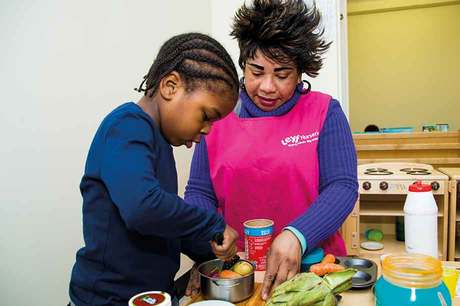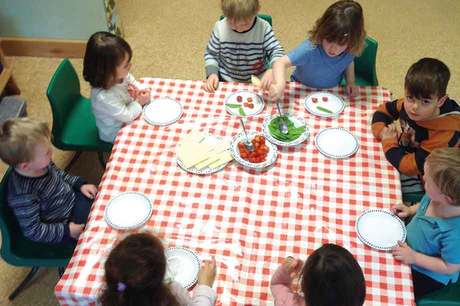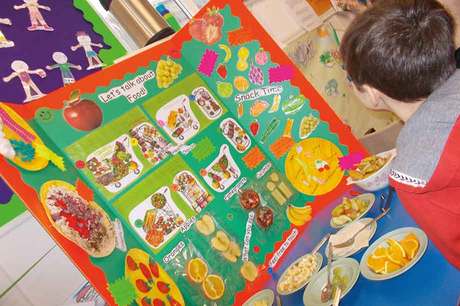
Nursery food is one of the areas of provision expected to be strongly affected when the 30-hour free childcare offer comes in later this year. With funding rates tight, it’s thought that nurseries will be forced to reduce the amount that they spend on ingredients – which may have an adverse effect on quality – or start charging parents an additional fee for meals.
‘Nurseries need to make their books balance – rents are up, business rates are not going down and we can’t cut staff numbers and keep to ratios. Where can nurseries cut corners? We may find that that happens with food, and that high-calorific, low-cost food is increasingly used in nurseries if the funding is inadequate,’ warns London Early Years Foundation (LEYF) chief executive June O’Sullivan.
‘On a limited budget, a chef has to be very clever to provide good-quality, nutritious food. The food that is served may look nice but be high in fat and salt and contribute to the growing problem of child obesity. There is also the issue that, without food standards and access to nutritionists, childcare providers don’t know if what they’re providing is nutritious for children.’ With this aim, LEYF has formed the Early Years Nutrition Partnership with the Pre-school Learning Alliance, British Nutrition Foundation and Danone to provide nutritional guidance at a reasonable cost.
At the moment LEYF does not plan to reduce what is spent on food and aims to continue providing a diverse menu of nutritious meals, the majority of which are prepared on site. ‘Like any business, we have to balance the books, but I’d rather we do that by cutting back on what we spend on resources rather than food because we know that some of our children are not getting nutritionally balanced food at home and coming to us hungry,’ Ms O’Sullivan says.
CHARGING FOR MEALS
Toad Hall Nursery Group, with nurseries across the South East of England, also prides itself on providing high-quality food, regarding it as a unique selling point. It was the first nursery group to be given recognition by the Children’s Food Trust for its menus and has produced a recipe book of healthy family meals. The chain will be charging families receiving the 30 hours funding for food.
‘The Government is happy to tell parents that it is free childcare, but there is no way there is more money in the pot to pay for food. With the 15-hour funding we’ve always included food because it is easier, but 30 hours is a different ballgame,’ explains chief executive Ruth Pimentel. ‘That’s a lot of time for a provider to give a high standard of nutrition and I feel it’s my moral duty, and duty of care, to encourage children to eat healthily and give them the right nutrients and food groups.
‘I’m not prepared to compromise on the standard of food that we provide for children, which has left us with no other real option other than to charge for food. We haven’t finalised how much we’ll be charging for food yet, but we’ll make a small amount from it, not a lot.’
The group ran a 30-hours funding pilot at its Watford nursery and didn’t receive complaints from parents when they were charged for meals, but Ms Pimentel thinks the Government should communicate to parents that the funding does not include food. This is echoed by NDNA’s chief executive Purnima Tanuku, ‘Government says it disagrees that the funding rates will be too low, but the indicative funding rates for 2017 published in September were met with widespread disappointment, with many providers telling NDNA they were not sustainable.
‘We believe that 30 free hours can work in all local authority areas if childcare providers are allowed full flexibility in charging for essential extras such as food, or additional activities such as language or dance sessions. We need to stop thinking about these hours as “free” and refer to them as “funded”.’
But Ms Pimentel warns that ‘unscrupulous providers’ may start charging ‘ridiculous’ amounts for food and use it to offset their losses on 30 hours. ‘They would be able to make a lot of money if they feed the children Value brands, and who is going to be checking?’ she says. ‘I believe Ofsted should regulate the quality of meals. It will all depend on the rules around 30 hours in the consultation and what can be charged as a reasonable amount. But it is a contentious issue that people are skirting around and it could potentially derail the 30 hours.’
PROMOTING HEALTHY LUNCH BOXES
Parents not wanting to pay extra for food may request to send their children with packed lunches, something that many settings serving hot food are against. ‘I believe it’s wholly unfeasible for nursery settings to cater, store and monitor packed lunches and for parents to work out whether the food they are giving their children is suitable,’ says Ms Pimentel. ‘We will not be allowing children to bring food in because of the risks linked to it. We need to be super-vigilant around allergies. Also, when it’s at nursery, we need to make sure that it is brought in and stored at the right temperature. I also can’t work out how they would bring all the food for 30 hours such as lunch, tea, morning and afternoon snacks. Would they bring it all?’

Children attending two LEYF settings take packed lunches because there are no kitchen facilities, but Ms O’Sullivan says that, even with a food policy, it is difficult to educate parents about what is a healthy lunch box. ‘We worry about the calibre of some of the children’s packed lunches. Some of them can be bizarre – one child brought in a cold McDonald’s – but some parents are really good, children bring food flasks with stews. For others they have the same things repeatedly such as honey sandwiches and biscuits, or processed things like Cheestrings,’ she says.
‘We encourage no crisps and suggest alternatives, but it is tricky because you are telling a parent what to feed their children. You can advise, make suggestions and hold workshops and hope that in the end parents do understand.’
She adds, ‘It is complex because food is an emotional thing, attached to the psyche of being a good parent, so I understand why my staff dance around the issue with parents.’
KIDZONE CRANWELL IN SLEAFORD, LINCOLNSHIRE
‘Our ethos is healthy, good-quality home-from-home food, which we’ve worked hard at providing. Sadly we’re entering worrying times with the 30 hours free childcare. Our business model will have to change drastically and the nice things reviewed, such as the fruit bowl in our lobby for children to snack on when they go home. Our food costs over a year are around £26,000 for 70 places, which we’ll need to reduce by at least 15 per cent,’ says manager Nikki Batt.

‘While we’re going to really scrutinise what we spend money on, we will still provide quality food for all children and won’t be allowing packed lunches. We already charge separately for food, currently £2.50 for a two-course hot lunch and £1.50 for a two-course tea. We’re waiting to confirm the funding but it’s likely we’ll be raising our food charges to cross-subsidise the lack of fees. We’ll also be reviewing our menus more frequently, probably every two months instead of six, to ensure they are cost-effective and include plenty of seasonal produce.
‘We’re fortunate to be based in Lincolnshire and have lots of fruit and vegetable wholesalers on our doorstep. We’ll continue to use our local butcher because it’s better quality than the supermarket, but we’ll look for cheaper cuts of meat to use in our meals, such as lamb rogan josh, and increase use of beans and pulses which are cheaper. We’ll also cook more vegetarian meals, like lentil daal with spinach and vegetable Bolognese, to reduce food costs.
‘Many children have 90 per cent of their daily food from us and we must ensure it’s healthy. Sausages are the only processed meat we provide and they are given once in a four-week period. We don’t add salt, the bare minimum of sugar is used and fat or oil is only added if essential. Parents are aware of the standard of food that we provide and often say that it’s better than the children eat at home, so they are happy to pay extra for it.’
RIVER PRE-SCHOOL, DOVER, KENT
‘We’re a packaway pre-school and children bring packed lunches, but we provide a morning snack each day, at a cost of around £20 a week for 24 children. We’ve already had to make cutbacks on that because while our funding has remained the same, wages and other costs have gone up,’ says manager Zoe Tyler.
‘The local greengrocer used to put together a nice mix of seasonal fruit and vegetables for us, but sadly we found the cost of this was mounting too high. We now do a weekly supermarket shop for snack items. We give the same amount of food but it’s cheaper. We have to do this shop at the weekend because we don’t have the ratios to cover it.

‘Eighty per cent of our children are funded, and what we’re funded is less than the hourly rate of £4, so we’re losing money before the 30 hours comes in. It will have a big impact and we’re working with a sustainability officer at Kent County Council to put in a contingency plan. We now work just to ratio in order to recoup money and rebuild our bank balance in preparation, but reducing the amount we spend on the children’s snack will be the last resort. We don’t want to reduce the amount of choice and the nutritional content, but at some point this may have to be considered.
‘Children put their packed lunches on a trolley when they arrive. Storage is minimal but we’re fortunate to have a big cool cupboard to wheel the lunches into and we monitor the temperature. We include information on healthy packed lunches in our welcome pack, ask for minimal treats and cakes, and frequently send out letters reminding parents of our no nuts policy and requesting ice packs in their lunches. We’ve never had to discuss the health content of a lunch but have raised or lowered quantity – for lunches leaving the child still hungry, in which case we top up with our snack items, and lowered for when a child is overwhelmed by quantity.
‘Staff sit with the children as they eat so it’s a social occasion. They’re used to having different packed lunches and have many conversations about what each other has got.’
BUSY BEES PRE-SCHOOL & DAY NURSERY IN BOURNE, LINCOLNSHIRE
‘We were formerly a sessional pre-school and didn’t have the facilities to cook food, so we’re very used to children bringing in packed lunches. Since moving premises we’ve provided a cooked meal, but around a third of children choose to bring in their food,’ says joint owner and manager Ruth Lister. ‘This is because they’re fussy eaters rather than parents not wanting to pay the £2 that we already charge separately for a hot meal. This amount covers the cost of employing a chef and the food costs. While I think we’ll be raising this amount next year by up to 20p per day as food costs rise, we wouldn’t increase it as a form of top-up to our funding. We ask for a donation towards snacks for funded children, or parents are welcome to send in their own.
‘Providing hot food and allowing packed lunches isn’t problematic. We publish the weekly menu and parents choose which days they want their child to have a hot lunch or bring their own lunch. We have a healthy-eating policy which we make parents aware of; this covers not allowing chocolate or sweets, and a blanket ban on nuts for allergy reasons. We won’t heat up food from packed lunches for safety reasons, but they’re welcome to bring hot food in flasks, although families tend to stick to sandwiches and pasta salads. We ask parents to send ice packs in their lunch boxes but we will store them in the fridge if parents request it in hot weather.
‘Children with packed lunches sit separately and staff monitor what a child brings in, so if they feel they are consistently not bringing in a decent lunch we will raise it as a safeguarding issue. Over the years we’ve had to do this a few times, often because they’ve brought very little, such as just a couple of crackers. We’ll then call the parents and give the child a hot meal or supplement the lunch with a sandwich or yoghurt.’
MORE INFORMATION
Early Years Nutrition Partnership, www.eynpartnership.org









